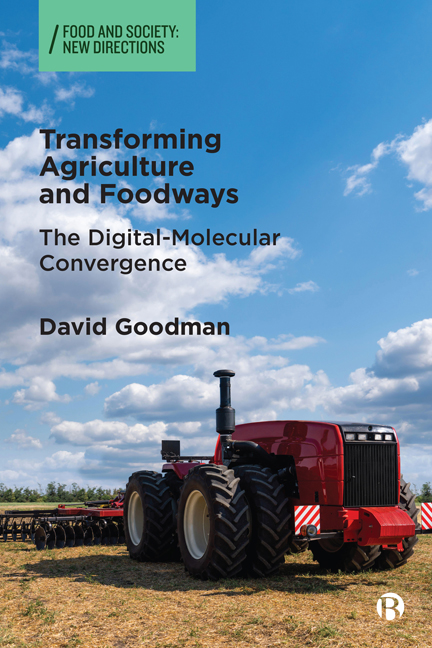Book contents
- Frontmatter
- Dedication
- Contents
- Series Preface
- List of Abbreviations
- Acknowledgements
- 1 Introduction: Technological Convergence and Change in Modern Agro-Food Systems
- 2 Precision Agriculture: Big Data Analytics, Farm Support Platforms, and Concentration in the AgTech Space
- 3 Precision Agriculture: Adoption, ‘Re-Scripting’, Farmer Identity, Path Dependence, and ‘Appropriationism 4.0’
- 4 Alternative Proteins: Bio-Mimicry, Structuring the New Protein Industry, ‘Promissory Narratives’, and ‘Substitutionism 4.0’
- 5 Agri-Biotechnology and the Failed Promises of the Seed-Chemical Complex, CRISPR and Gene Editing, and Regulatory Capture
- 6 Between Physical Space and Digital Space: COVID-19, Platform Capitalism, and Changing Patterns of Food Provisioning
- 7 Conclusion: Continuities in Change and Lost Opportunities
- Postscript
- Notes
- References
- Index
7 - Conclusion: Continuities in Change and Lost Opportunities
Published online by Cambridge University Press: 18 January 2024
- Frontmatter
- Dedication
- Contents
- Series Preface
- List of Abbreviations
- Acknowledgements
- 1 Introduction: Technological Convergence and Change in Modern Agro-Food Systems
- 2 Precision Agriculture: Big Data Analytics, Farm Support Platforms, and Concentration in the AgTech Space
- 3 Precision Agriculture: Adoption, ‘Re-Scripting’, Farmer Identity, Path Dependence, and ‘Appropriationism 4.0’
- 4 Alternative Proteins: Bio-Mimicry, Structuring the New Protein Industry, ‘Promissory Narratives’, and ‘Substitutionism 4.0’
- 5 Agri-Biotechnology and the Failed Promises of the Seed-Chemical Complex, CRISPR and Gene Editing, and Regulatory Capture
- 6 Between Physical Space and Digital Space: COVID-19, Platform Capitalism, and Changing Patterns of Food Provisioning
- 7 Conclusion: Continuities in Change and Lost Opportunities
- Postscript
- Notes
- References
- Index
Summary
In a book on technological innovation and change, it is surprising to find so many strong continuities on multiple scales: from the global food system and agro-industrial sectors to competitive ‘treadmill’ innovation at the farm level. Looking back over individual chapters, the shifts in space, time, scale, and social practice that co-produce new socio-spatial relations – the high-resolution, miniaturised digital ‘grids’ of PA, or gene driving at agro-ecosystem scale – are being accommodated within the hegemonic industrial agro-food system. Indeed, the longevity of this political economic paradigm is the central and most striking continuity of all. To understand these historical continuities, we have drawn on evolutionary economics, and particularly the concepts of lock-in and path-dependence.
The structural changes generated by this model, including the loss of rural livelihoods, farm indebtedness, land consolidation, corporate concentration, and environmental degradation, for example, are equally long-standing and have captured the attention of past generations of scholar-activists, such as Rachel Carson, author of Silent Spring (1962), and social scientists, particularly with the emergence of critical rural sociology and the ‘new’ political economy of agriculture in the 1980s (Buttel and Newby, 1980; Newby, 1983; Friedland et al, 1991). These deep-seated trends and the underlying path dependencies have intensified in recent decades, as we saw in Chapters 2, 3, and 5, drawing on the research of John MacDonald and colleagues, the IATP (2020), Philip Howard (2016, 2021) and reports by the ETC Group.
The critique of the IATP (2020) has particular salience here with its indictment of US farm policy for its serial failure to arrest, let alone reverse, the social injustices exacerbated by these trends, extending from the international farm crisis of the 1980s. Perhaps most significantly, the IATP highlights an enduring continuity in the ethos of farm policy, articulated by Secretary of Agriculture, Earl Butz's mantra in the 1970s and reiterated by a successor, Sonny Perdue, in 2018, of ‘Go big, or get out’, expressing a profound indifference to the future of the family farm, rural employment, and rural communities.
- Type
- Chapter
- Information
- Transforming Agriculture and FoodwaysThe Digital-Molecular Convergence, pp. 88 - 95Publisher: Bristol University PressPrint publication year: 2023



